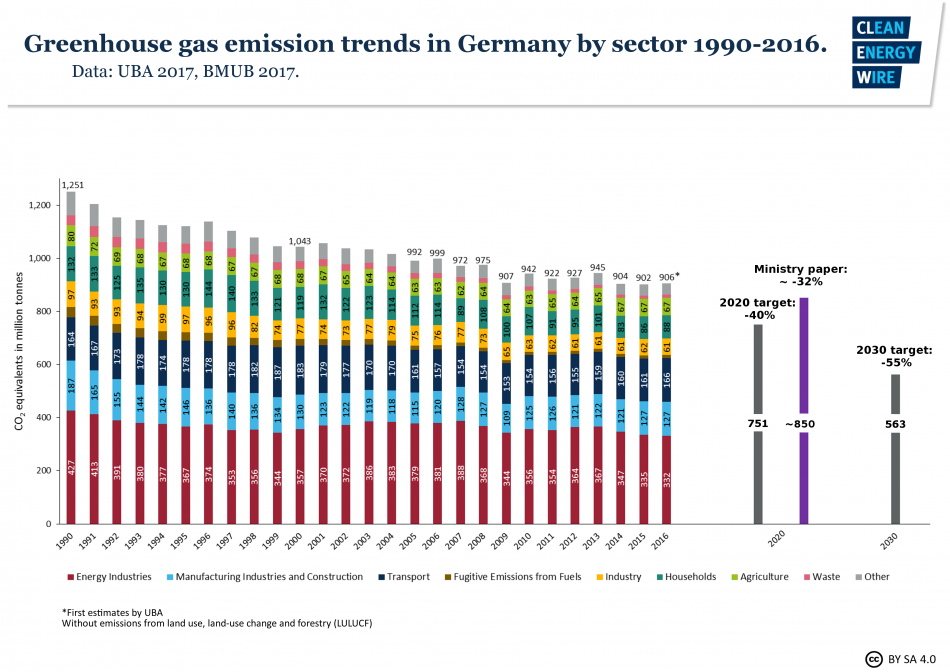Merkel: 2020 climate target plays big role in upcoming coalition talks
Chancellor Merkel said that reaching Germany's 2020 climate targets was a "very ambitious task" that would require "a lot of effort". However, "I don’t want to give up the target here today”, she said. “I just want to say that it can’t be reached without making efforts", Merkel said, adding that the 2020 targets will "play a big role" in the upcoming coalition talks starting next week.
At a conference organised by the Trade Union for mining, chemicals and energy industries (IG BCE), Merkel said that Germany managed to reduce its emissions by 20 percent between 1990 and 2010 - a period that included the German reunification and the closure of former East German industrial sites - and that achieving another 20 percent by 2020 was going to be challenging. “It was always clear” that it was not going to be easy “to save another 20 percent of CO₂ at a time of relatively strong economic development”.
One day earlier, an internal environment ministry paper stated that the country was bound to fail in its efforts to meet its 2020 emissions reduction target. Germany has made climate protection a priority of its Energiewende, the dual shift from fossil fuel and nuclear power to a renewables-based energy system.
Consensus on hard coal phase-out could be blueprint for lignite exit
Today, hard coal and lignite are responsible for about one third of Germany’s CO₂ emissions, and still account for 40 percent of electricity production. Coal-fired power production has a long history in Germany, but hard coal production has collapsed in recent decades due to falling profitability. Stakeholders agreed to cease hard coal mining for good in 2018.
Lignite, however, is still mined on a large scale, and provides a significant number of jobs in the affected regions - though the total number of jobs in lignite mining has dropped to around 20,000. [Find more background in the CLEW factsheet When will Germany finally ditch coal?]
Merkel said that Germany’s hard coal exit could serve as a blueprint for a lignite phase-out. The country has been able to prevent numerous structural breaks “by progressing step-by-step over many years, and by doing it based on a large social consensus”. Merkel said that the government could not be indifferent to the question of what will replace lignite mining in the affected areas.
Coal exit contentious issue in upcoming coalition talks
Many energy experts say that Germany can cut its emissions significantly in the short term by closing its dirtiest lignite-fired power plants. This is a prominent Green Party demand in the upcoming coalition talks with Merkel’s conservatives (CDU/CSU) and the free-market FDP.
In the wake of the general election in September, a weakened Merkel now faces the difficult task of forming a so-called ´Jamaica coalition´, dubbed this way because the colours of the parties involved - black (CDU/CSU), yellow (FDP), and green - mirror the Caribbean country’s flag. Such a coalition is seen as the only viable option after the Social Democrats (SPD) decided to join the opposition in the incoming federal parliament.
“It’s clear that forming this government will not be easy,” Merkel told the union representatives. “We know that unusual constellations also hold the opportunity to find solutions to things that have previously appeared unsolvable. So we have to get stuck in and see what we can do.”
The first exploratory talks on forming a coalition government are set to start next week on 18 October, after the citizens of Lower Saxony head to the polls on 15 October to elect a new state parliament. The vote in Germany’s number one wind power state and home to carmaker Volkswagen is seen as an important marker on the road to a new federal government.
The country’s future climate and energy policy is one of the biggest stumbling blocks to ´Jamaica´, including the future of coal. The CDU and the Green Party agree that the country will have to phase out coal-fired power production. Yet, the parties’ energy representatives have argued over the speed and shape of this phase-out at an event in held Berlin this week.
FDP head Christian Lindner said that climate-related issues would not pose an insurmountable obstacle to the coalition talks, but his party insists on introducing more market-based principles to the Energiewende. Reaching the targets set out in the Paris Climate Agreement was the overall goal of Germany’s energy and climate policy, he told to conference participants. Yet, Germany should not just focus on energy generation and “declare conventional energy generation an enemy”, as had been done with nuclear power. Conventional power generation had to “be given the opportunity to compete in open markets”, he said in Hanover.
At the conference in Hanover, IG BCE head Michael Vassiliadis said the union’s members feared “that our people in the mining areas will have to foot the bill for a ´Jamaica´ wedding party”. He called on the next government to give coal mining regions undergoing structural change a “sufficiently-financed and reliable prospect”. However, the IG BCE stood by the Paris Agreement’s climate targets with “no ifs and buts”, he added.
Coal exit commission in 2018
In late 2016 and after months of wrangling, the German government finally passed its Climate Action Plan 2050 detailing how the country aims to honour its commitments under the Paris Climate Agreement and become virtually carbon-neutral by 2050. Due to strong resistance, also from the IG BCE, it refrained from announcing a specific date for the last lignite station to go offline.
Instead, it states that a “commission for growth, structural change and regional development” – seen by analysts as a coal-exit commission without that name – would discuss the transformation measures needed in climate protection after 2018.



